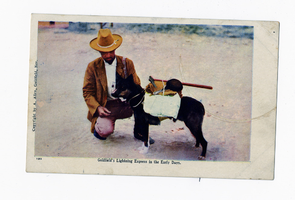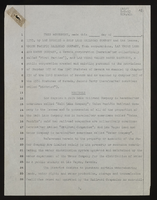Search the Special Collections and Archives Portal
Search Results

Transcript of interview with Betty and Gus Ciliax by Connie Boich, March 2, 1977
Date
Archival Collection
Description
On March 2, 1977, collector Connie Boich interviewed Betty (born March 31, 1919 in Bisbee, Arizona) and Gus Ciliax (born May 13, 1909 in Michigan) in the Ciliax home in Las Vegas, Nevada. This interview covers Southern Nevada and early development of the area. During the interview, they also discussed local recreation, prostitution, Block 16, and various social activities, in addition to local businesses, such as Six Companies, the economy, Boulder Dam, and education in Nevada.
Text
Deanna Stefanelli oral history interview
Identifier
Abstract
Oral history interview with Deanna Stefanelli conducted by Claytee D. White on May 03, 2010 for the Boyer Early Las Vegas Oral History Project. Stefanelli discusses working part-time at the University of Nevada Las Vegas Libraries in 1981, eventually becoming full-time and working in the library administration office as well as in the Curriculum Materials Library. She also talks about her experiences in library administration until her retirement in 2010.
Archival Collection

Transcript of interview with Elmore Curtis by Judy Curtis, March 1, 1975
Date
Archival Collection
Description
On March 1, 1975, collector Judy L. Curtis interviewed fire department captain, Elmore B. Curtis (born December 17th, 1896 in Minnesota) in his home in Las Vegas, Nevada. This interview covers life in Southern Nevada since 1942, including Mr. Curtis’s personal history and the early development of the Nevada Test Site. During the interview Mr. Curtis also discusses early tourism and socio-economic progress in Southern Nevada.
Text

Amber Diskin oral history interview: transcript
Date
Archival Collection
Description
Oral history interview with Amber Diskin conducted by Barbara Tabach on January 5, 2018 for the Remembering 1 October Oral History Project. In this interview, Amber Diskin discusses her experience at the Route 91 Harvest music festival during the October 1, 2017 mass shooting in Las Vegas, Nevada. Diskin talks about finding her way home after escaping the crowds and letting her family and friends know she was not hurt. She speaks of the aftermath of the shooting, including how her children were affected, the post-traumatic stress disorder she developed, and how the shooting has affected her love of concerts. As a native Nevadan, she shares her views of Las Vegas and how her sense of community deepened after this event. Diskin ends the interview by discussing her appreciation for the first responders and the gift baskets she helped distribute to hospitals, police stations, and the fire department.
Text
Herb Tobman oral history interview
Identifier
Abstract
Oral history interview with Herb Tobman conducted by Stephen Tidwell on April 23, 1986 for the UNLV University Libraries Oral History Collection.
In this interview, Herb Tobman discusses his upbringing in the Bronx, New York, his Russian-Jewish ancestry, and his service in the United States Navy. He talks about his move to Las Vegas, Nevada with his wife in 1952 and his employment history, starting with his ownership of a used furniture store and the Western Cab Company; his executive casino work as general manager of the Moulin Rouge Hotel and the Aladdin Hotel and Casino; and as president of the Stardust Resort and Casino and Fremont Hotel and Casino. Tobman shares his involvement in the community, how the city of Las Vegas has grown and changed, and the happiness he and his family have experienced living in Las Vegas.
Archival Collection
Gerri Schroder oral history interview
Identifier
Abstract
Oral history interview with Gerri Schroder conducted by Cecilia Winchell, Jerwin Tiu, and Stefani Evans on September 2, 2022 for the Reflections: The Las Vegas Asian American and Pacific Islander Oral History Project. In this interview, Schroder discusses her childhood in both California and Michigan. She discusses attending Orange Coast College, and later moving to Las Vegas, Nevada with her husband for a job opportunity. Schroder first began her community invovlement by participating in the Henderson Beautification Planning Commission. She gradually became more involved in several community activities including campaigns, commissions, and committees. Amongst them was Bill Clinton's presidential campaign and the National League of Cities. Schroder carried out three terms as Councilwoman and continues to work with the local and national community on issues that she finds most valuable, including the Las Vegas water crisis, women's rights, and public safety.
Archival Collection

Transcript of interview with Barbara Barnett by Charles Chesnutt, March 8, 1981
Date
Archival Collection
Description
Text

"Goldfields' Lighting Express in the early days.", postcard
Date
Archival Collection
Description
Image


